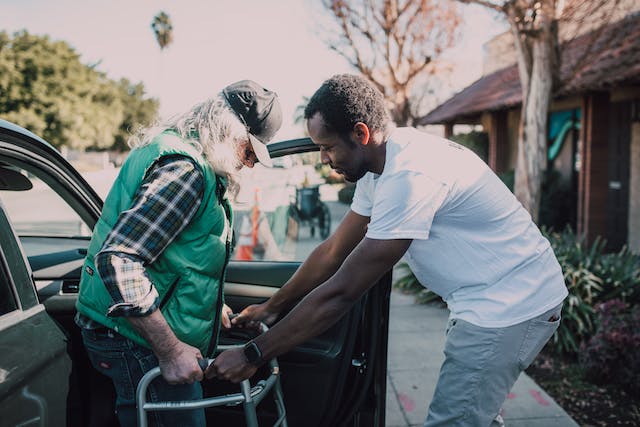How to Help Your Loved Ones with Serious Problems: Vital Steps

Supporting our loved ones, especially during times of severe problems, is an act of profound compassion and solidarity. It’s about more than simple companionship; it’s about being a reliable pillar of strength when the storms of life become overwhelming.
However, when these problems escalate to greater magnitudes, the dynamics often change. The process becomes more complex, demanding not just emotional support but also strategic guidance, and sometimes professional intervention.
It’s not always easy, but standing by them in these challenging times can make a substantial difference in their resilience, recovery, and overall well-being. In the subsequent parts of this document, we will delve into the vital steps to help loved ones navigate through serious problems.
Recognizing the Problem
Look out for drastic changes in behavior, mood, or physical appearance that might signal a problem. The sooner you recognize the signs, the easier it will be to intervene and assist them in dealing with their problems.
For example, is your elderly loved one having health issues in the nursing home? Should you get in touch with a nursing home bedsores lawyer or maybe a medical malpractice attorney? Is your little sister struggling with her mental health, and if so, what can you do to help?
Problem recognition is crucial in understanding the magnitude of the situation and taking the necessary steps to support your loved one. Furthermore, it’s essential to approach them with empathy and understanding. Avoid being judgmental or dismissive as this could cause further damage.
Open Communication
Establish a safe space for your loved one to share their feelings and thoughts. Don’t force them to talk, but let them know that you are there to listen without judgment. Sometimes, they might not feel comfortable sharing with you, and that’s okay. Encourage them to seek other forms of support such as therapy or support groups. Additionally, be mindful of your language when communicating with them. Use positive and empowering words that will uplift their spirits and encourage them to keep fighting.
Furthermore, avoid advising unless they ask for it. Sometimes, all they need is someone to listen and understand. Even if you don’t have a solution to their problem, your presence and support can make a significant difference. For example, if your friend is going through a breakup, they might not want to hear “You’ll find someone better,” but rather “I’m here for you no matter what.”
Expressing Concern and Love
Avoid blaming or criticizing; instead, offer reassurances of your unwavering support and care. Let them know that you are there for them through thick and thin. You could also offer to help in practical ways, such as running errands or being a listening ear. Additionally, express your concern for their well-being and offer to help them seek professional assistance if necessary.
Be patient and understanding if they are resistant to seeking help immediately; change takes time, and it’s essential to respect their pace. In a way, our love might not be able to directly solve their problems, but it can provide them with the necessary support and encouragement to seek help and work towards healing. On the other hand, if they are not ready to seek help, respect their decision but continue being there for them and checking up on them regularly.
Encouraging Professional Help
Depending on the severity of the problem, professional help might be necessary – encourage your loved one to seek help from therapists, counselors, or other health professionals. Offer to help them research different options and make appointments if needed. You could also accompany them to their sessions for moral support.
Remember that professional help is not a sign of weakness but rather a way of taking care of oneself. By seeking professional help, your loved one can learn coping mechanisms and strategies to manage their problems better. Additionally, therapy or counseling provides an unbiased perspective on the situation and can help your loved one gain a deeper understanding of their emotions and behaviors.
Show Up and Be Present
Be there for them – emotionally and physically whenever possible. Your presence can provide a great deal of comfort. Whether it’s a phone call, a text message, or a surprise visit, showing up for your loved one shows that you care. Additionally, plan activities that you both enjoy together to lift their spirits and remind them of the goodness in life.
It’s essential to show your loved one that they are not alone in their struggles and that they have someone who loves and supports them unconditionally. Be patient and understanding and remind them that you will always be there for them no matter what. For instance, if your sibling is struggling with addiction, be there for them during their recovery process and show them that you believe in their ability to overcome their struggles.
Educate Yourself
This knowledge will help you provide better support and understand what they’re going through. Read books, attend workshops, or seek advice from professionals to gain more insight into the problem your loved one is facing. This will not only help you provide better support but also equip you with the tools and resources to assist them in their journey towards healing.
Additionally, educating yourself about the problem can help reduce any stigma or misconceptions surrounding it. A lot can stem from ignorance, whether it’s our own or that of others. By educating ourselves, we can become better allies and advocates for our loved ones going through serious problems.

Taking Care of Yourself
Last but not least, remember to take care of your health too. You can’t pour from an empty cup – maintaining your own well-being is essential to being able to support others effectively. Take breaks when needed, seek support from friends and family, and practice self-care regularly. You are only human, and it’s okay not to have all the answers or be able to solve someone else’s problems. Know your limits and set boundaries if necessary.
Remember that supporting a loved one through serious problems can be emotionally draining, but also incredibly rewarding. Practice self-compassion and remind yourself that you are doing the best you can. Your loved one appreciates your efforts, and your support means more to them than words can express.
Supporting our loved ones with serious problems is a journey – it requires patience, compassion, and understanding. It’s not always easy, but standing by them through thick and thin can make a world of difference. Remember to recognize the problem, establish open communication, express concern and love, encourage professional help, show up and be present, educate yourself, and take care of your own well-being.
Together, we can create a supportive environment for our loved ones to heal and thrive. Let us continue spreading love and kindness in the face of adversity.



